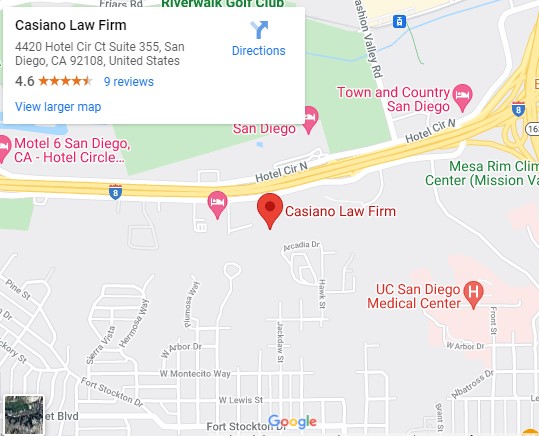Why You Should Make an Estate Plan in San Diego, CA
Everyone needs an estate plan, not just the super-wealthy. Estate planning is planning for the orderly distribution of your property to your heirs. But it encompasses much more.
Estate planning has five major purposes, one or more of which will surely apply to you. With a good estate plan you can:
- Designate how your assets are to be distributed among beneficiaries after you die.
- Avoid or minimize the delays and expense of probate.
- Appoint a guardian for your minor children and a person to manage the children’s assets.
- Provide for the possibility that you will become incapacitated and unable to manage your finances or make medical and other decisions for yourself.
- Eliminate or minimize estate taxes.
Distribution of your Assets on Death.
If you die without an estate plan, the state will provide a plan for you. Every state has a law that specifies who gets your property if you die without a will or other documents for passing your property. The law is a “one size fits all” plan that attempts to predict how most people would like their property distributed. Typically, your property would go partly to your spouse with the rest to your children in equal shares. If you don’t have a spouse or children, your property would go to other relatives such as parents or siblings.
This plan may not be suitable in many instances. For example, you may want to:
- Leave unequal shares to your children because they have different needs or you have already provided more help to one during your life.
- Ensure that property left to a spouse will go to your children from a different marriage on the spouse’s death, rather than to the spouse’s children or relatives.
- Disinherit a child.
- Leave your estate to a life partner to whom you are not married.
- Leave a gift to a grandchild, a more distant relative, or a friend.
- Leave a contribution to charity.
Avoiding Probate.
Probate, the court-supervised process of distributing your estate, can be time-consuming and expensive. You can minimize the assets that need to pass through probate or eliminate probate altogether by using certain devices such as:
- Revocable living trusts.
- Joint tenancies with rights of survivorship.
- Transfer on death deeds or pay on death accounts.
- Beneficiary designations for life insurance and retirement plans.
Providing for Minor Children.
If you have minor children you will want to name a guardian to care for them in the event of your death. Although a court will need to appoint the guardian, most courts will follow your wishes in the absence of a compelling reason not to. Minors can’t be given property outright. You will need to designate someone to manage your children’s property until they are adults and able to manage it themselves.
Preparing for Your Incapacity.
In your estate planning documents, you can designate someone to manage your financial affairs should you become unable to do so. You can also specify how your incapacity is to be established. With the proper documents in place, you will save your family the expense and stress of having to go to court to get guardianship.
You can designate a person to make medical decisions for you when you no longer can. And you can provide written guidelines for that person as to what type of end-of-life treatment you want.
Reducing Estate Taxes.
Most people will not owe federal estate taxes. In fact, more than 99.9 percent of all estates are not subject to the federal estate tax. But if you expect your estate to be worth more than around $11 million, you will want to meet with me to discuss strategies for minimizing your estate taxes. These may involve making gifts while you are alive and establishing various trusts.
Can You Prepare Your Own Estate Plan?
The prevalence of do-it-yourself options for drafting estate planning documents leads many people to wonder whether they can prepare their own estate plans. However, writing your own estate plan is not a good idea. Estate planning is not a one size fits all model.
These do-it-yourself forms, whether found in books or online, are generated by estate planning computer software that is designed to cover only the most basic of estate planning needs. Even books and programs about estate planning recommend that you seek the expertise of an experienced elder law and estate planning attorney.
Self-drafted estate planning documents are notorious for mistakes. Some common problems include:
- Making a gift of one or more specific assets to a particular person without considering what will happen to that person’s inheritance if you no longer own the asset when you die. As a general rule, if your will attempts to give away an asset you no longer own, the gift lapses, and the beneficiary isn’t provided with an alternative gift.
- Not providing alternative beneficiaries who would take if the first-named person predeceases you. In this case, do you want the deceased beneficiary’s gift to go to his or her heirs or to someone else?
- Failing to provide for what should happen to the property in your estate that you have not specifically mentioned in your will. The property could be omitted through oversight; it could have been acquired after the will was drafted, or its intended beneficiary could have predeceased you and you did not name an alternate.
- Failing to provide for the possibility that you may have more children after executing your documents. States have laws designed to protect children born after a will is executed from being unintentionally disinherited. These laws vary and are not a guarantee.
- Not executing your estate planning documents with the legally required formalities.
A document that is improperly executed is not valid. In most states, a will must show the testator’s intent to make a will; the testator must have testamentary capacity; the will must be signed by the testator in the presence of two witnesses who watch the testator sign the will and then sign it themselves. The witnesses must also be disinterested parties, which means they are not beneficiaries under the will. Other estate planning documents require similar execution procedures.
Estate planning is a complex endeavor that puts clients at risk for many mistakes. Working with me will ensure that you avoid them.
Consult a San Diego Estate Planning Attorney Today!
If you have questions about estate planning or are ready to begin work on your estate plan, please call me. I will guide you through the process of developing your estate plan and help you take advantage of the best estate planning tools for your situation.

